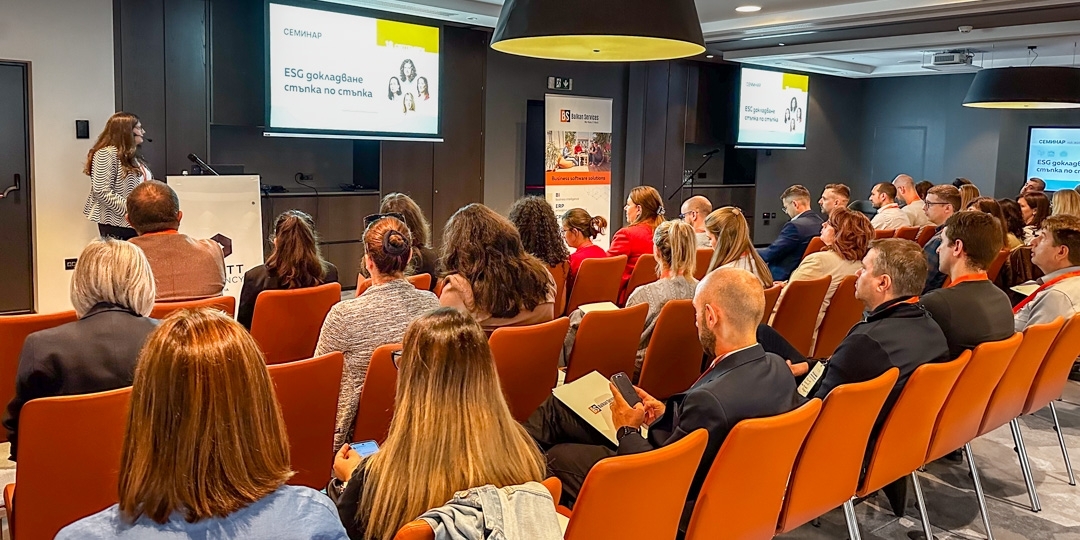What are the challenges companies face when preparing their first ESG report? What is the process, and to what standards should businesses report? And how do modern software solutions automate the management of the entire process from data collection to submission of the final sustainability report? Answers to these and many other topical questions regarding ESG reporting were given by speakers from the Balkan Services team during the practical workshop "ESG Reporting Step by Step".
The event, which was held live on 18 September 2024 at Hyatt Regency Sofia, was attended by more than 60 management and audit representatives from some of the country's largest companies.
Desislava Bulgaranova, Head of the Finance Systems and Solutions Department and Partner at Balkan Services, moderated the seminar.
She presented the results of the latest global survey conducted by the independent agency Business Application Research Center (BARC) on the challenges and recommendations for 2025 related to ESG reporting, with a focus on Europe. Desislava Bulgaranova drew attention to one of the main conclusions, which points out that the two main reasons for companies to proceed with ESG reporting and the reputation they build and enhance are on par with their obligations imposed by regulations on the topic of sustainability.
Ilka Kiselova, Senior ESG Consultant at Balkan Services, explains the standards and their reporting requirements.
The consultancy's expert in the field of sustainability reporting drew attention to the fact that the report's content is determined by the topics and issues essential for each company and the conditions in which it operates. Interestingly, the legislation allows for deferred reporting, and examples of data that falls within this scope were given. One of the messages of the presentation was that the European standards require activity in the long term. Still, in the first reports, companies can refer to the key elements that have made their business sustainable over the years and relate them to the reporting requirements of the standard.
Ilka Kiselova described the ESG reporting process in detail, highlighting that automated solutions are available for most of these steps.
Antonina Moteva, Senior Financial Systems and Solutions Consultant at Balkan Services, and Vanya Yordanova, Senior Disclosure Management and XBRL Consultant, presented helpful software in the ESG reporting process and sustainability reporting.
Balkan Services experts demonstrated sustainability reporting software solutions developed by Lucanet to the seminar participants. The German technology company is known for its eponymous financial consolidation and planning solution, which Balkan Services offers, implements, and consults.
Antonina Moteva noted that Lucanet is building on its technology products by developing a CFO Solution platform that encompasses different solutions and covers the needs of finance teams worldwide.
She demonstrated at which point in the ESG reporting process Lucanet's software solution can be incorporated, namely the initiation of the data collection process. The software assists in calculating the required KPIs, analyzing the data, and generating the sustainability report itself as a final.
Vanya Yordanova demonstrated how the software solution creates a final ESG report that is consistent in terms of layout, design, and content. She pointed out the main challenges in compiling such a document and how technology can overcome them.
A panel discussion, which brought together the intersections between business, audit, and ESG consultants, was also held during the workshop.
The panellists, Milka Damyanova, Associate Partner, BDO AFA Ltd., and Georgi Stoyanov, CPA—Senior Audit Manager Assurance, Head of IFRS Committee, Grant Thornton Bulgaria, shared their observations on the state of Bulgarian business in terms of ESG reporting.
Emil Velichkov, Head of Sustainable Development, EU Programmes & Financial Instruments at the bank, spoke more about the challenges in preparing the first ESG report of Bulgarian-American Credit Bank (BACB) and why the financial institution voluntarily took this step.
Yordanka Kovačka, the company's Chief Financial Officer, discussed the good examples in Bulgaria and the motivation of Elektorohold Bulgaria EOOD to take action on sustainability.
In conclusion, Adriana Koleva, FCG Povvik, Environmental Consultant, summarized what measuring the impact of sustainability commitments on business from an environmental perspective consists of and what the readiness of Bulgarian companies to deal with complex tasks such as greenhouse gas inventories according to the Climate Reporting Standard.
The seminar ended with a light networking lunch.

